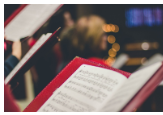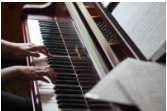The standards for High School Choral Music, Beginning Level enable students to obtain musical knowledge and skills in a choral setting. Students learn to read, write, and notate music using basic music theory concepts and perform music from a variety of music styles, composers, cultural influences, and historical periods. They begin to develop choral skills, including singing in unison and two-part harmony, with emphasis on vocal production techniques and ensemble performance. Students apply emerging music skills to create and notate original work. Students explore choral music as a means of expression and communication and examine opportunities for engaging in music beyond the classroom. Through the collaborative environment of the choral setting, students develop an understanding of teamwork and leadership skills and develop an understanding of appropriate etiquette as a performer and as an audience member. Opportunities are provided for students to participate in local, district, and regional music events as appropriate to level, ability, and interest. After-school rehearsals and performances may be required of students. Content in this course changes annually; therefore, this course may be repeated.
No prerequisite required
Essential Question: How do I use the musical instrument I was born with to express myself?
|
Quarter |
Quarter 1 |
Quarter 2 |
Quarter 3 |
Quarter 4 |
|
Unit Title |
Getting to Know You; My Voice and the Music it Makes |
Listen, Create, Perform, and Respond: Building that Strong Foundation |
Creation, Skill Development and Reflection Lead to Musical Growth |
Through musical time and space, where do I find my musical place? |
|
Image Cue |
 |
 |
 |
 |
|
Focus of the Story |
At the beginning of the year, students learn about their instrument, their voice, and how to take care of it. Learning to read the pitches specific to our parts on the music staff supports our focus on the key musical concepts. |
We continue to develop fundamental choral skills to gain awareness of how music literacy, voice, collaboration and artistic creativity work together to build a solid musical foundation. |
Applying our music literacy skills opens doors to opportunities in musical creativity and composition, and allows us to apply the artistry that comes after learning our parts in a choral piece. |
Our year concludes by exploring the relationship between music, culture, careers and history on a local and global scale including how it relates to us. Demonstrating our growth as musicians in final performances concludes the year while illuminating paths for future opportunities. |
|
Transfer Goals |
Understand and apply creative processes to guide the development of ideas, original works, and musical performance. Understand and find meaning in music as a form of community engagement through involvement as a performer, supporter, advocate, and audience member. Explore and connect personal interests, experiences, and aspirations through vocation, advocacy, and arts patronage. Use music literacy to demonstrate understanding of the elements of music and the ways they inform artistic performance and creative expression. |
Understand and apply creative processes to guide the development of ideas, original works, and musical performance. Analyze, interpret, and evaluate musical works from a variety of cultures. Understand and find meaning in music as a form of community engagement through involvement as a performer, supporter, advocate, and audience member. Use music literacy to demonstrate understanding of the elements of music and the ways they inform artistic performance and creative expression. |
Understand and find meaning in music as a form of community engagement through involvement as a performer, supporter, advocate, and audience member. Explore and connect personal interests, experiences, and aspirations through vocation, advocacy, and arts patronage. Use music literacy to demonstrate understanding of the elements of music and the ways they inform artistic performance and creative expression. Use technology as a strategic mechanism for improving music literacy and improving music performance. |
Understand and apply creative processes to guide the development of ideas, original works, and musical performance. Analyze, interpret, and evaluate musical works from a variety of cultures. Understand and find meaning in music as a form of community engagement through involvement as a performer, supporter, advocate, and audience member. Explore and connect personal interests, experiences, and aspirations through vocation, advocacy, and arts patronage. Curate a portfolio of accomplishments, experiences, and performance materials exhibiting oneself as an artist. Use music literacy to demonstrate understanding of the elements of music and the ways they inform artistic performance and creative expression. |
|
Learning Targets |
I can identify my voice part. I can demonstrate proper rehearsal etiquette. I can cooperate and collaborate as a singer in a rehearsal. I can identify the components of a musical score. I can follow my part throughout a musical score. I can sit and stand using proper choral posture. I can demonstrate proper breathing technique for choral singing. I can correctly participate in vocal warm ups to develop vocal agility and range. I can find the top and bottom note of my vocal range on the keyboard and notate it on a staff. I can describe music using music terminology. I can read and count rhythmic patterns. I can identify duple and triple meter. I can conduct a 2, 3, and 4, pattern. I can identify parts of the voca anatomy. I can describe elements of proper vocal health maintenance. I can sing my assigned part within the ensemble. I can prepare for an audition. |
I can improvise simple rhythmic and melodic examples in call-and-response styles. I can determine what elements of music are most important to my preferences. I can evaluate a piece of music or performance using musical terminology. I can demonstrate collaborative skill in a performance. I can discuss the value of music to my community. I can aurally identify major and minor tonalities I can listen while I sing and adjust my intonation, diction, dynamics, rhythm, and tone to contribute to a good choral blend. I can respond to basic conducting patterns and interpretive gestures. I can sing expressively using proper facial and physical expression. I can compose a four-measure rhythmic-melodic variation. I can discuss personal responses to music and music’s expressive qualities using musical terminology. I can define the rules for identifying key signatures. I can identify musical patterns by ear. I can write simple four-measure rhythmic phrases from dictation. I can interpret the components of a vocal score. I can play one octave major scales starting on white keys using the whole and half step patterns. |
I can begin an original composition. I can receive and give feedback about compositions. I can determine the quality of a work of music using musical terminology and personal preferences. I can describe ethical standards as applied to music. I can describe ways in which technology has influenced vocal/choral music. I can identify markings for tempo. I can identify the intervals M2, M3, P4, P5, octave by ear and play on the piano. I can write a musical variation. I can sight-sing eight-measures using solfege. I can correctly notate my composition. I can play on the keyboard eight-measure, stepwise melodic patterns using scale degrees 1 through 5 of a major scale |
I can identify and describe the cultural context of the repertoire we are studying. I can identify and describe the historical context of the repertoire we are studying. I can use credible resources to obtain information about culture and history. I can perform music in a lnguage other than English. I can perform music with and without accompaniment. I can respond to music with appropriate movement. I can identify career options in music. I can use credible resources to obtain information about careers I can use credible resources to obtain information about the relationship of vocal music to other fields of knowledge. I can play four measures of an exercise on the keyboard. |
